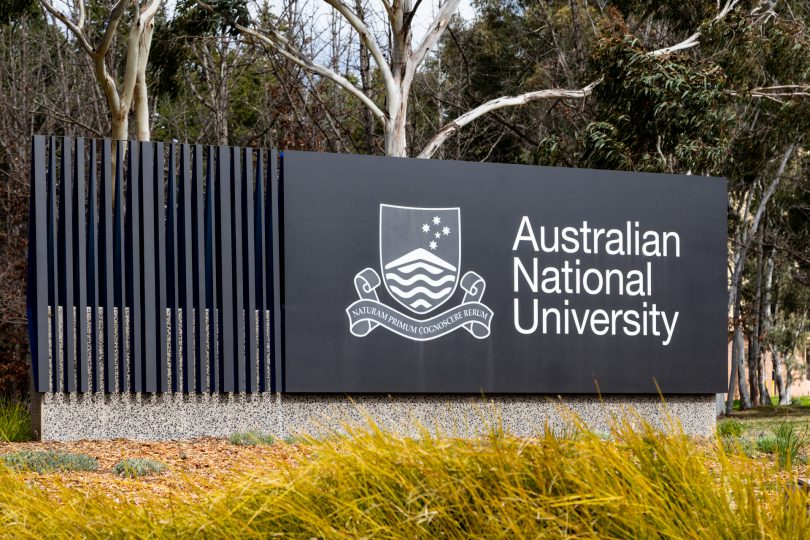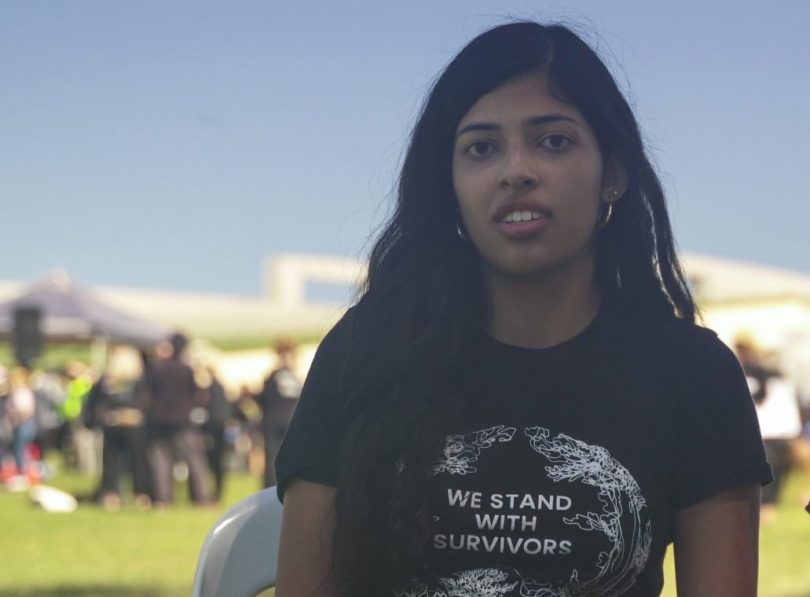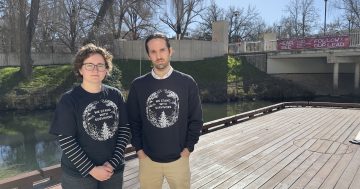
ANU has failed to deliver specific actions over the past five years, the Student Association says. Photo: Michelle Kroll.
The ANU has been accused of dragging its feet in response to the high rate of sexual harassment and assault on campus as new figures show little improvement since the damning 2017 Human Rights Commission report.
Universities Australia released its 2021 National Student Safety Survey (NSSS) on sexual assault and sexual harassment yesterday (23 March), and the ANU says that across a number of the categories its students’ experiences were higher than the national average.
The specific ANU figures show that 26.1 per cent of the 1,647 respondents reported being sexually harassed at some point during their time at university, almost twice the national average, and 14.5 per cent were harassed in the past 12 months.
They show 12.3 per cent reported that they had been sexually assaulted at some point during their time at university, three times the national average, and 4.5 per cent in the past 12 months.
Nationally, one in six students (16.1%) reported being sexually harassed at university, and one in 12 (8.1%) in the past 12 months. One in 20 (4.5%) and one in 90 (1.1%) said they had been sexually assaulted since starting university and in the past 12 months.
The majority of ANU harassment and assault victims were women or a differently described gender. The most impactful incidents occurred in residential halls or student accommodation (32.9%), higher than the national average.
The national figures show that a quarter of sexual assaults occur in these settings.
Only 3 per cent of ANU students who were sexually harassed made a formal complaint, and 18.6 per cent sought support or assistance, higher than the national average, with 65.6 per cent knowing some or all of the perpetrators involved.
The ANU did not report sexual assault figures, although it said a higher percentage of its students know where to make a complaint or seek support for sexual assault than the national average.
Almost half did not know or knew very little about where to go to make a complaint about harassment or assault, but slightly more knew where to seek support.
The survey comes only days after the ANU launched its Student Safety and Wellbeing Plan but the ANU Students Association says it was rushed out without consultation ahead of what it knew would be a bad set of numbers.

ANU Women’s Officer Avan Daruwalla: “It’s incredibly neglectful that they’ve failed to follow through.” Photo: ANU.
ANU Women’s Officer Avan Daruwalla said the figures were not surprising but still shocking and condemned the ANU’s inability to provide specific and actionable responses over the past five years.
She said there was nothing in the Student Safety and Wellbeing Plan that could not have been done earlier, such as increased professional staffing in residential halls or more caseworkers.
The residential halls were an epicentre for bad behaviour and should be dealt with immediately, she said. As it is, they are already understaffed and she hopes 14 new staff can be secured quickly.
Ms Daruwalla said the zero-tolerance policy came without a timeline and what it would include.
“It’s incredibly neglectful that they’ve failed to follow through and take action,” she said.
“If 26 per cent of students were experiencing a different kind of crime, we would have seen a much more rapid response.”
Ms Daruwalla said mandatory consent training was a good thing and welcomed it being expanded, but it had not much impact on the statistics and needed to be improved.
The ANUSA is launching a fresh campaign and is calling for:
- The creation of an actionable Cultural Change Action Plan.
- A zero-tolerance approach that precludes students who have demonstrated violent, antisocial and threatening behaviour from residential accommodation.
- The cessation of outsourcing pastoral care to for-profit institutions.
- The establishment of an empowered oversight body including student representatives to hold ANU accountable and directly report to the Vice-Chancellor.
- Commitment to creation of prevention campaigns based directly on feedback provided by student leaders with real, on-the-ground experience.
ANU Vice-Chancellor Professor Brian Schmidt said the survey results were confronting and further evidence of the need for continued and strong action.
He insisted the newly announced Student Safety and Wellbeing Plan showed the ANU was stepping up its action to prevent and deal with sexual violence on campus.
“Each and every instance of sexual assault and sexual harassment is unacceptable, and ANU has a zero-tolerance approach to perpetrators and their behaviour,” Professor Schmidt said.
“Confronting this challenge means we will always need to listen to victim-survivors, to act on the evidence, and to do more.
“ANU is listening and acting, and we are making major new investments to stop and respond to these unacceptable behaviours.”
An ANU spokesperson said the Plan would accelerate what had been under way for some time.
“In the last five years we’ve set up and staffed a Respectful Relationships Unit, recruited case managers, streamlined reporting, established an online disclosure tool and trained thousands of staff and students to recognise, prevent and respond to sexual assault and sexual harassment. And we’ve excluded perpetrators of sexual misconduct from our community,” the spokesperson said.
The spokesperson said the Plan was sent to every ANU student on Monday and the University had been consulting student leaders on a fortnightly basis about the Plan since August 2021.
“ANU constantly engages with ANUSA, including on this issue. We engaged with them on the independent assessment of our Sexual Violence Prevention Strategy, which underpins this plan, and the elements of the Plan, many of which they have previously called for,” the spokesperson said.
“Action to embed zero-tolerance in our culture, policies and disciplinary procedures, to recruit more ANU staff members to care for our students, to create new oversight body and to run prevention campaigns is all either under way or funded in our latest Plan.”
The ANU says it will publish more detailed results in due course after discussions within the university sector about releasing them in a way that ensures victim-survivors are protected, and participants’ privacy is respected.
The University of Canberra said that of 1494 UC students who responded to the survey, the prevalence of sexual harassment at UC in the past 12 months was 10.2 per cent (17.5 per cent since the start of university) and 1.7 per cent in the past 12 months for sexual assault (4.9 per cent since the start of university).
Vice-Chancellor Professor Paddy Nixon said the findings highlight that the university has more work to do to address inappropriate behaviour and improve awareness of how survivors can access support and report an incident.
“The university continues to address campus safety in a proactive and appropriate manner to ensure that all members of our community – students, staff and visitors – feel supported and safe here,” Professor Nixon said.
He added that UC would continue to raise awareness of the university’s support services and ensure survivors, witnesses and bystanders know how to report incidents.
“We will address campus culture through our UC Respect campaign to promote a culture of respect on our campus as a collective,” Professor Nixon said.
“And we have already increased security patrols and improved security personnel visibility in areas of concern.”


















